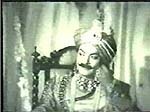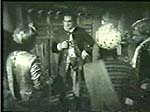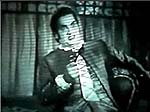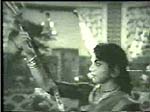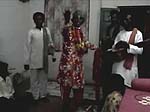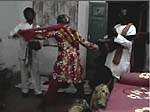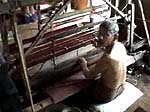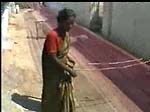|
Bobbili Yuddham (The Bobbili War), an Indian film of the 1950's [quicktime]
On February 9th, 2001, a troupe of players performed the Bobbili Katha in Visakhapatnam. They performed it as a "borra katha," a stylized presentation that allows for a main singer and accompanying musicians. The clips available below are from that performance. This troupe of players is based in a town near the city of Bobbili. They travel enough for their performances that to book them one needs to wait until they return to their home town, or until someone hears of their whereabouts. In this case, a day's travel in the area served to track them down, and have them journey the 100 kilometers the following day for the performance. Budumúri Appalaswámi is the lead singer. He is sixty, and has been performing this and other stories for thirty-five years. Appalaswámi learned this trade from his brother. The musicians are Piridi Appalaswámi on tambura, Budumúri Simháchalam (Appalaswámi's younger brother) accompanies the lead singer and tells jokes, Kómatipalli Pólésvarráo is on the drum, and Budumúri Appalanáydu is a backup singer. None of the performers is a Velama. The Bobbili Katha remains one of this group's most sought after presentations. Appalaswámi estimated that he might perform this particular story ten times a month. He has a repertoire of a dozen of so tales. The performance itself echoes the gist of the film more than it does either the earliest version or the early twentieth-century printed version. That is, the focus is on the glory of the heroes of Bobbili, their valor, their strength and courage. Individuals are the key, and not a history of events in the area. In this case, however, there is none of the nationalist tenor to the narrative. The foreigner, Bussy, is simply another combatant, or character in the tale. Anger over what transpires and the resulting villainy is saved for Vizianagaram. As with the film, the sub-plot of the Beri Komatis is omitted. This speaks to the trend that took shape over the course of the twentieth century--the story ceased to be about life in the area and at Bobbili and how a battle was waged and lost. Firmly in the center now are the Velama heroes. This trend developed as "Velama" took shape in the form of a meaningful category of virtuous person (the Raja of Bobbili and his people are briefly introduced as Velamas in the film and in the performance). Once that happened, that label needed little coaxing. Velama meaning flowers as we see and hear the heroes and their actions extolled
|
